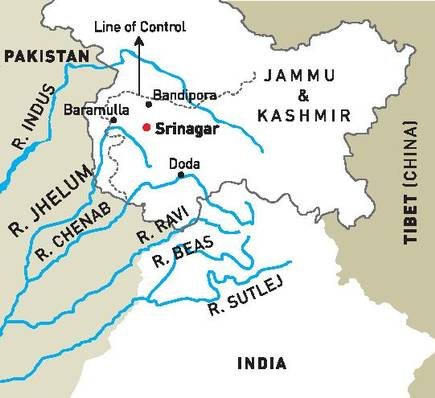Indus Water Treaty
What is the Indus Water Treaty (IWT)?
- Signed in the year 1960 by former Prime Minister Jawaharlal Nehru and the then President of Pakistan, Ayub Khan, the Indus Water Treaty is an agreement that was made to chalk out the control over the 6 rivers that run across India and then Pakistan into the Indus basin.
- This treaty was signed following the partition of the subcontinent.
- On an international level, the IWT has been seen as one of the most successful cases of conflict resolution. It is so because India and Pakistan, ever since IWT was signed, have engaged in 4 major wars but the treaty has stayed in place.
Which rivers belong to India and which ones to Pakistan?
- The Indus Waters Treaty was signed in 1960 after nine years of negotiations between India and Pakistan with the help of the World Bank, which is also a signatory.
- Precise details were laid out about how the water will be divided.
- While Jhelum, Chenab and Indus (3 western rivers) were allocated to Pakistan, India received the control of Ravi, Beas and Sutlej (3 eastern rivers).

- In effect, Pakistan got 80% of the water from the Indus river system and India 20%.
- If disputes arose, the two parties would try to solve them bilaterally first. Appointing a “Neutral Expert” and approaching the International Court of Arbitration are other options.
- The treaty also stated that aside from certain cases such as specified domestic, non-consumptive and agricultural use permitted to India, no storage and irrigation systems can be built by India on the western rivers.
Why in News?
- Indian and Pakistani negotiators ended another round of talks as a part of the Indus Water Treaty on “cordial” terms, said the Ministry of External Affairs, describing the 118th meeting of the Permanent Indus Commission that took place in Delhi on May 30-31.
- The MEA did not give any details on the issues that were on the agenda for discussion, including Pakistan’s request for flood-flow data sharing and objections to hydropower projects planned on “western rivers” in Jammu & Kashmir.
- However, it said that the annual report of the Commission for the previous year had been finalised and signed, indicating some consensus on the way forward on a number of issues that come up each year.
Reference:
Subscribe
Login
0 Comments
